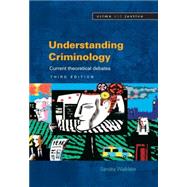
| Series editor's foreword | p. viii |
| Preface and acknowledgments to the 3rd edition | p. x |
| Introduction: understanding some key features of criminology | p. 1 |
| Some domain assumptions within criminology as a discipline | p. 2 |
| Criminology and modernity | p. 2 |
| How to define the criminal | p. 5 |
| What influences talk about crime? | p. 6 |
| What do we know about crime? | p. 7 |
| What is known about criminal victimization? | p. 10 |
| Criminology, politics and criminal justice policy | p. 11 |
| Conclusion: what are the key features of criminology? | p. 14 |
| Further reading | p. 16 |
| Perspectives in criminological theory | p. 17 |
| The behaviour of criminals | p. 17 |
| The criminality of behaviour | p. 22 |
| The criminality of the state | p. 28 |
| Conclusion | p. 36 |
| Further reading | p. 36 |
| Understanding 'right realism' | p. 38 |
| Socio-biological explanations: the work of Wilson and Herrnstein | p. 39 |
| Rational choice theory | p. 42 |
| The routine activity approach | p. 44 |
| Administrative criminology | p. 45 |
| Right realism: a critique | p. 47 |
| Ways of thinking about the family and crime | p. 49 |
| Conclusion | p. 56 |
| Further reading | p. 58 |
| Understanding 'left realism' | p. 59 |
| What is 'left realism'? | p. 60 |
| Left realism UK style: a critique | p. 66 |
| Left realism US style | p. 74 |
| The modernist dilemma | p. 77 |
| Left realism and New Labour: politics, policy and process | p. 78 |
| Conclusion | p. 81 |
| Further reading | p. 82 |
| Gendering the criminal | p. 83 |
| The gender blindness of criminology | p. 83 |
| Feminism and criminology | p. 84 |
| Feminisms and criminology: contradictions in terms? | p. 89 |
| Ways of thinking about men within criminology | p. 90 |
| Sex role theory and criminology | p. 91 |
| Categorical theory and criminology | p. 95 |
| Doing gender as criminology | p. 96 |
| Biography and the psychoanalytical turn | p. 99 |
| Reflections on masculinity and criminology | p. 100 |
| Summary: gendering the criminal or gendering criminology? | p. 101 |
| Conclusion | p. 103 |
| Further reading | p. 104 |
| Crime, politics and welfare | p. 105 |
| Understanding the welfare state | p. 106 |
| Why it is important to understand the relationship between the citizen and the state | p. 111 |
| New Labour, new policies? Young people and crime | p. 113 |
| Young people, crime and antisocial behaviour | p. 115 |
| Conclusion: questions for criminology | p. 117 |
| Further reading | p. 118 |
| Criminal victimization, politics and welfare | p. 119 |
| What is victimology? | p. 119 |
| A challenging victimology? | p. 128 |
| Rebalancing the criminal justice system | p. 129 |
| Feminism, policy and violence | p. 136 |
| Ethnicity and hate crimes | p. 140 |
| Conclusion: criminal victimization and social responsibility | p. 142 |
| Further reading | p. 144 |
| Conclusions: new directions for criminology? | p. 145 |
| Positivism, modernism and gender | p. 145 |
| A word on cultural criminology | p. 148 |
| Gender, race and class | p. 150 |
| Criminology and risk | p. 151 |
| Criminology and trust | p. 154 |
| Criminology, the citizen and the state | p. 157 |
| Criminology, political economy and social capital | p. 159 |
| Conclusion | p. 160 |
| Glossary | p. 161 |
| References | p. 164 |
| Index | p. 177 |
| Table of Contents provided by Ingram. All Rights Reserved. |
The New copy of this book will include any supplemental materials advertised. Please check the title of the book to determine if it should include any access cards, study guides, lab manuals, CDs, etc.
The Used, Rental and eBook copies of this book are not guaranteed to include any supplemental materials. Typically, only the book itself is included. This is true even if the title states it includes any access cards, study guides, lab manuals, CDs, etc.